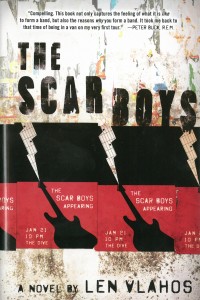Len Vlahos’s Scar Boys explores a friendship between two boys, one who feels inferior (the protagonist Harry) because of his scars from a terrible accident when he was young and the other (Johnny) who takes advantage of Harry’s feelings of inferiority to control and direct his friend in the way he wants to go. Johnny and Harry form a band, a band that turns out to be successful; and the success of the band allows Harry to take charge of himself again. The novel explores critical questions about the basis of friendship, and whether a friendship formed in and lived through apparent inequality can ever become “equal”? It also explores interesting questions of perception, as Harry’s perception of Johnny as controlling may not be entirely accurate, a truth we learn only late in the game, when we realize how much Harry really does mean to Johnny, when another tragic accident changes the ground rules on which their friendship was founded. A novel that teens will gravitate to and enjoy on all levels.
Len joined me for an interview.
1. Physical deformity is an important—but largely unexplored—area of YA literature. Can you recommend a couple other books with protagonists who were burned, have other visible scars, and/or are amputees?
Vlahos: The truth is, I tried to stay away from anything else that was similar to The Scar Boys while I was writing, and am doing that again now that I’m working on the sequel (Scar Girl). I worry about being—even inadvertently—influenced. That said, certainly Wonder comes to mind, as does a much older book, The Elephant Man. And, of course, there are a plethora of books about kids with disorders that manifest themselves in different ways. I loved When I Was the Greatest by Jason Reynolds, which features a character with Tourette Syndrome, and Black Swan Green by David Mitchell which features a character with a stutter. I should also add that I ran across a Canadian non profit that helps people with facial disfigurement called About Face. They’re doing really great work… http://www.aboutface.ca
2. The kids in your book were so damn cruel, breathtakingly so. Where does this kind of cruelty come from? How do we stop it?
Vlahos: Wow, that is a big question. The truth is, kids are can be cruel. Our teenage years are a time when we explore boundaries of all kinds. Boundaries of friendship, of intellect, of sexuality, and of power. The exploration of those boundaries is often manifested in dangerous and painful ways. Right now, I think it’s a mixed big. On the one hand, bullying is getting worse, on the other, more is being done to stop it.
We are, as a society, increasingly desensitized. Through a glut of media, kids are exposed to more violence, to more hate, and to more apathy than perhaps we were when we were young. (Though given my age, that is perhaps a skewed perspective.) Bullying has also become more complex and prevalent through anonymous, abusive behavior on social media. But there are positives, too. The light being shined on bullying all across the country is making a difference, and because kids are exposed to so much more through the media, they are perhaps more tolerant of differences — be they in appearance, sexual orientation, or religious beliefs—than the previous generation. As I say, it’s a mixed bag, but I’m optimistic it’s getting better. (Though it will never fully go away. It is, as I say, human nature.)
That said, we do need eternal vigilance to try to tamp in down or stamp it out anywhere we can.
3. I wanted Harry to name the bullies that almost killed him. He refuses to identify them for the police or his parents. This is of course realistic, for victims of bullies to be quiet about it when nobody knows—the shame factor comes into play. But once people know about the bullying and adults get involved, that can disappear. Why did you choose to have him remain silent—forever?
Vlahos: The main point of The Scar Boys is how music can give a confidence, friends, happiness, and even save a life. I needed Harry to feel completely isolated, allowing music to come in and save the day. I felt that by outing the bullies his life would likely have gone in a different direction. He needed to be, feel, and seem powerless in order for the narrative to work.
4. Can you talk about music as an important force for personal healing in the life of your protagonist? Why is this vehicle so powerful for so many different things?
Vlahos: Along with math, music is a truly universal language. I’ve never heard of a culture where music isn’t part of the fabric of that culture, if not in fact central to it. Music is particularly important among teens as it’s a point of self identification, shared experience, and common understanding. To me, music is almost a kind of magic.
